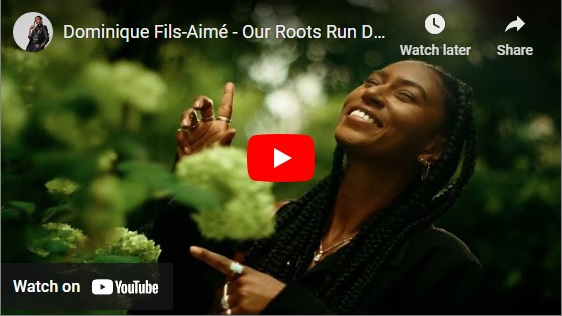Dominique Fils-Aimé was supposed to be on tour when she found herself flat on her back, bed-bound. The Montréal-based singer-songwriter was injured, and forced to cancel tour dates. But as she focused on recovery, and feeling “gratitude through the pain,” something wove its way to her: her fourth album, Our Roots Run Deep.
“It came out in one shot – in a week,” she explains, at the Dark Horse Espresso Bar, during a recent trip to Toronto, “in the order that’s now on the album. I could tell what the story was. It was from the roots, all the way up to feeling that the plant world was us [humans], ending with me as a plant in the sunshine.” Fils-Aimé tilts her head back and smiles. “I imagined the little leaves on top of the trees taking in the sun. That’s how I knew it wasn’t just me, but spirit.”
Our Roots Run Deep begins her second trilogy, and this time, it’s all about her deep connection to Mother Earth as a healer, and source of inspiration and love, as well as the heart chakra. The chakra system has driven the energy behind Fils-Aimé’s work from the start, and she often uses it, and visual art, as initial stages to tap into an album’s theme, message, and energy. Her first trilogy began with the blue and blues-inspired Nameless (2018), to the fiery-red, jazz-driven, and JUNO Award-winning Stay Tuned! (2019), to Three Little Words (2021), and its sunlight-yellow theme that celebrated soul, disco, and freedom. Today, it’s all about green, blossoming, and the heart.
“In the past, I took everything I could from emotional states,” says Fils-Aimé. “Resilience was a huge inspiration for me. It was about meditating on how our roots [African Diaspora] go way deeper than the 200 years of trauma we went through. There’s way more inter-generational wealth than trauma, and this is what we use to heal, and ensure that the trauma and the joy can co-habitate.
“There was way less brain work,” she continues. “Less reflection, more feeling, love. It’s all the heart. I feel that, for the first time, I was truly open and vulnerable, in a way I haven’t necessarily been. I was maybe 75, 80 percent in the past, but now I’m getting to 95, closer and closer. And that’s the journey.”
Fils-Aimé has become known for her petal-like layering of vocals, all of which she tracks herself, including the masculine voices. She also continues to work with Jacques Roy, who helps translate the emotion of her songs into instrumentation. “He’s been directing from the beginning, so he knows me well,” she says. “He does the upright bass, as well, on the album. And he’s kind of a translator to the musicians. Since I don’t write music, I’ll say, ‘I want to feel this,’ and then he’ll translate it so musicians get it.”
What are the challenges of being a Québec-based artist working to break out in Canada (and the world)?
“Truth be told, I know I haven’t really felt confronted by these challenges, because my manager was probably facing them for me, while I was focusing on the music. I’m definitely grateful for that. Something I do believe, though, is that starting local, and growing as organically as possible, will lead to the music reaching outwards, in due time. Allowing the team to build, at the same pace as a community of listeners who truly connect with the artistry, is worth giving it time. They’ll both be needed to establish stable and long-lasting relationships with new territories.”
She also cites the inclusion of percussionist Elli Miller Maboungou and trumpeter Hichem Khalfa as important collaborators on Our Roots Run Deep. “I wanted to make sure there was percussion on this album to bring us back to the roots,” says Fils-Aimé. “And the trumpet to be another voice singing, so that we remember that voices can come in all shapes and forms.”
Fils-Aimé released her first EP independently in 2015, after having no luck signing to a label. That all changed when she met EnSoul Records co-founder, Kevin Annocque, and she’s been signed and managed by the label since 2016. She now sees her body of work reverberate among fans who find it a healing balm in a trying world. “Meeting people who say, ‘I felt this way,’ or ‘I needed a boost, and I listened to that song,’” she sighs, “I can cry. It makes me feel like, OK, I’m not insane. It’s not in my mind. Music has this power, and I will continue to use it, because if you do it for the right purpose, it will pick up somewhere. That feels amazing.”
And for Fils-Aimé, it’s this healing nature of art, song, and music that she hopes to inspire in others. “There’s a story of a hummingbird who sees a forest burning,” she says, likening her work to the parable, “and he gets this little drop of water, and the other birds laugh at him and say, ‘What are you doing?’ He replies, ‘I’m bringing my drop, and if we all bring our drop, we might put out the fire.”’ She smiles thoughtfully as she concludes. “Every drop matters.”
